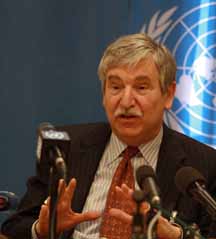Former hostage in Iran to speak
Wednesday, October 30, 2013
Former hostage in Iran to speak

John W. Limbert, a veteran U.S. diplomat who was held hostage for 14 months in Iran, will speak on “U.S.- Iranian Relations” at 11 a.m. on Monday, Nov. 4, in room 108 at the Wes Watkins Center in Stillwater. The talk is free and open to the public.
Limbert holds the Department of State’s highest award—the Distinguished Service Award—and the department’s Award for Valor, which he received in 1981 after being held as a hostage in Iran. Limbert had been working as a Foreign Service officer at the U.S. Embassy in Tehran for only 12 weeks when it was overrun by Iranian students who held him and 51 other Americans hostage for over a year.
Appointed the first-ever U.S. Deputy Assistant Secretary of State for Iran in 2009, Limbert resigned in July of 2010 to return to his teaching position with the U.S. Naval Academy, citing his frustration with the lack of diplomatic progress. A native of Washington, D.C., he served as president of the American Foreign Service Association (2003-05) and ambassador to Mauritania (2000-03).
Limbert is a professor of Middle Eastern studies at the U.S. Naval Academy, where he teaches courses in history and political science. During a 34-year career in the United States Foreign Service, he served mostly in the Middle East and Islamic Africa, including postings to Iran, Iraq, Sudan, Algeria, Saudi Arabia, and the United Arab Emirates. He received his Ph.D. in history and Middle Eastern studies from Harvard, and speaks Persian, Arabian and French.
Before joining the Foreign Service, he taught in Iran as a Peace Corps volunteer in Kurdestan (1964-66) and as an instructor at Shiraz University (1969-72). He has written several articles and books on Middle Eastern subjects including Iran at War with History (Westview Press, 1987), Shiraz in the Age of Hafez (University of Washington Press, 2004), and Negotiating with Iran: Wrestling the Ghosts of History (U.S. Institute of Peace, 2009).
